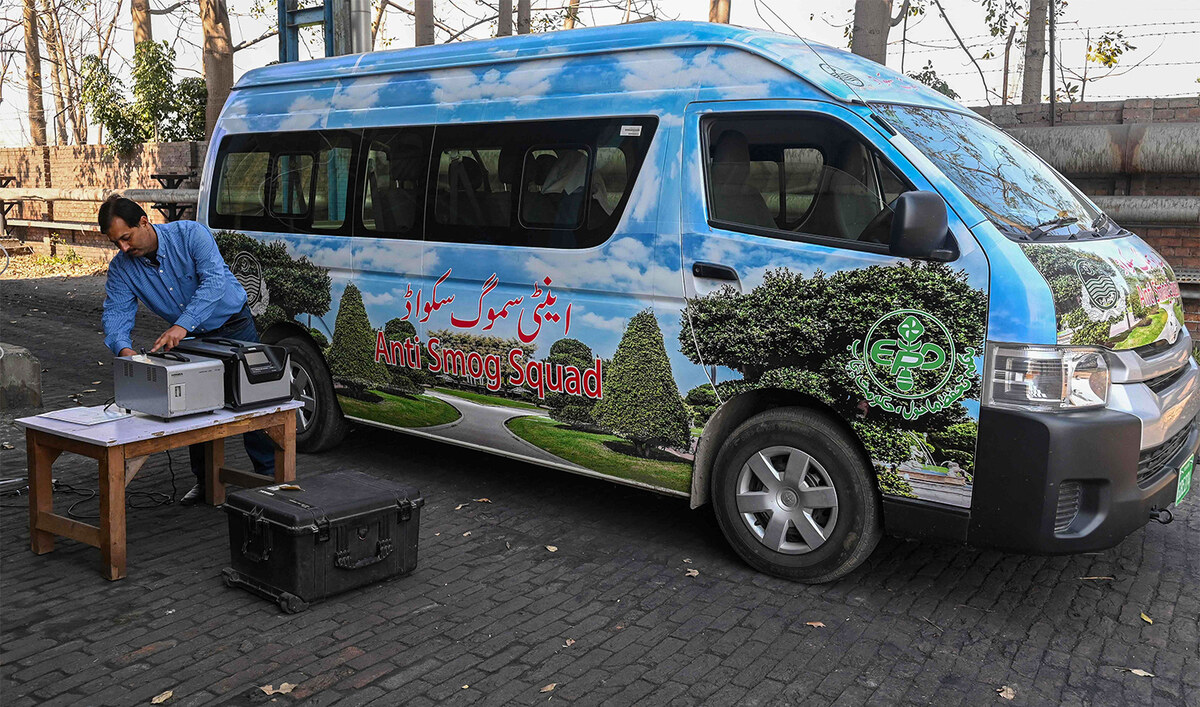ISLAMABAD: Pakistan's newly-elected government, which is expected to be sworn in within days with cricket legend Imran Khan as prime minister, will plant billions of trees to tackle the effects of climate change.
Malik Amin Aslam, who is tipped to become environment minister, said the 10 Billion Tree Tsunami programme would see trees planted nationwide, including in the four provincial capitals.
That follows a vast tree-planting project in recent years in Khyber Pukhtunkwa province by Khan's Pakistan Tehreek-i-Insaf (PTI) party.
"PTI is a party with a green promise," Aslam said, adding that the combination of environmental degradation and damage due to climate issues was costing 3-4 percent of Pakistan's near-$300 billion economy annually.
Aslam said the country was spending one billion rupees ($8.1 million) a day "on issues arising from environmental neglect".
"Climate change is only making it worse," Aslam told attendees at a discussion on the environment and climate change at the Sustainable Development Policy Institute (SDPI), a thinktank, in Islamabad on July 31.
Aslam told the Thomson Reuters Foundation that Khan believed climate change was an enormous challenge that had to be tackled head on.
And, Aslam added, Khan felt the PTI's green promise was central to how the party views a sustainable future for Pakistan - with cleaner air, cleaner water and a country prepared to face up to and combat climate change.
Khan's party won 116 seats of the 272 seats in parliament in the July 25 poll, while the party of ousted and jailed premier Nawaz Sharif trailed in second with 64 seats.
PROVINCIAL PROMISE
In 2013, Khan's PTI won enough seats in Khyber Pukhtunkwa's assembly to form the provincial government.
It introduced a green-growth initiative to tackle deforestation, build more small-scale hydroelectric projects and overhaul national parks. The Billion Tree Tsunami project was part of that initiative.
Aslam, the project's architect, said it had changed the province's landscape. He said Pakistan needs to do more.
"Pakistan's green cover is going down. Our cities have become concrete jungles and there is increasing air pollution. Our mode of development is wrong," Aslam said.At the PTI's launch of its 'First 100 Days Agenda', held a month before the July 25 ballot, Khan told the audience of party members and media that global warming "is a reality".
"We will be badly affected... We can counter it with trees. Growing trees is not a luxury - it is for our survival."
Khan lauded his provincial government's tree-planting project, which he said had met its targets - 40 percent from planting trees, and the remainder from assisting the natural regeneration of existing forests.
Pakistani climate expert Adil Najam, who is dean of Boston University's Pardee School of Global Studies, said the PTI had made the environment - "especially planting trees" - its issue.
"And (it has) demonstrated that you can get political mileage from environmental issues," he said, describing that as a major step forward.
"This also comes at a time when the public awareness of these issues – especially water and climate concerns – are on the rise. So, there is certainly the potential of momentum."
He said the key test would be keeping the political focus on the policy, and ensuring action.
NATIONAL DELIVERY
Experts say Pakistan is facing enormous environmental challenges. A survey conducted by the SDPI ahead of the 2018 poll found that respondents prioritized three key environmental issues: rising temperatures, water shortages and air pollution.
Aslam said PTI's experience in delivering on the green agenda for Khyber Pukhtunkwa province had put it in good stead to do so nationally.
"We set out targets in clean energy, forests, clean water, and we met them," he said, adding that the province's tree-planting project had been the largest eco-investment in the country's history, and had met its targets using just half the allocated budget.
The PTI's 100 Days Agenda document also stated it would establish a task force to draft green legislation and devise more projects.
Kashmala Kakakhel, a climate finance expert who helped with the 100 Days Agenda document, said thinking on climate change needed to evolve from "piecemeal, project-based interventions to a guiding principle for Pakistan's development agenda".
"We need to recognise it as an economic opportunity, with an immense potential for job creation," she said.
"This government plans to review (or develop new) targets for our renewable energy mix, for increasing our forest cover, for developing along a climate resilient pathway."
She pointed out that once targets were set nationally, specific interventions could be designed.
"This will also aid in identifying which interventions we can fund ourselves, and for which ones we will need to tap into international climate finance funding opportunities."
CHINA MODEL?
Aslam also said the new government wanted to green the China-Pakistan Economic Corridor (CPEC), a multi-billion-dollar Chinese-funded infrastructure project.
He said that while visiting China in his capacity as the vice-president of the International Union for Conservation of Nature (IUCN), a non-profit, he had been amazed at the "astronomical changes" underway as China cleans up its environment.
"We would like to strive for a green charter for CPEC," he said.
Despite the PTI's green focus, Pakistan remains committed under CPEC to developing its lignite coal reserves in the Thar Desert, with two coal power plants already functional, according to CPEC's website.
"Coal is an issue," Aslam admitted, adding that Pakistan could look to counter pollution by introducing "state-of-the-art environmental controls".
The head of the SDPI's Pak-China Study Centre, Shakeel Ramay, said coal's share of the country's energy mix is less than 10 percent.
"For the time being coal is an option and Pakistan should benefit from it as others have," he said.
"However, in the long run Pakistan must look for renewable sources of energy," he said.

















